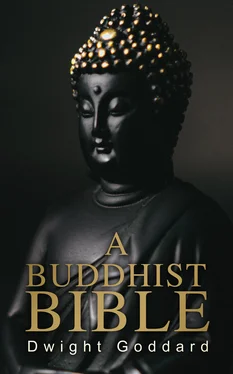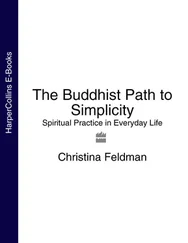There are four kinds of word discrimination, all of which are to be avoided because they are alike unreal. First there are the words indicating individual marks which rise from discriminating forms and signs as being real in themselves and, then, becoming attached to them. There are memory-words which rise from the unreal surroundings which come before the mind when it recalls some previous experience. Then there are words growing out of attachment to the erroneous distinctions and speculations of the mental processes. And finally, there are words growing out of inherited prejudices as seeds of habit-energy have accumulated since beginningless time, or which had their origin in some long forgotten clinging to false-imagination and erroneous speculations.
Then there are words where there are no corresponding objects, as for instance, the hare's horns, a barren woman's child, etc.--there are no such things but we have the words, just the same. Words are an artificial creation; there are Buddha-lands where there are no words. In some Buddha-lands ideas are indicated by looking steadily, in others by gestures, in still others by a frown, by a movement of the eyes, by laughing, by yawning, by the clearing of the throat, or by trembling. For instance, in the Buddha-land of the Tathagata Samantabhadra, Bodhisattvas, by a dhyana transcending words and ideas, attain the recognition of all things as un-born and they, also, experience various most excellent Samadhis that transcend words. Even in this world such specialised beings as ants and bees carry on their activities very well without recourse to words. No, Mahamati, the validity of things is independent of the validity of words.
Moreover, there are other things that belong to words, namely, the syllable-body of words, the name-body of words, and the sentence-body of words. By. syllable-body is meant that by which words and sentences are set up or indicated: there is a reason for some syllables, some are mnemonic, and some are chosen arbitrarily. By name-body is meant the object depending upon which a name-word obtains its significance, or in other words, name-body is the "substance" of a name-word. By sentence-body is meant the completion of the meaning by expressing the word more fully in a sentence. The name for this sentence-body is suggested by the footprints left in the road by elephants, horses, people, deer, cattle, goats, etc. But neither words nor sentences can exactly express meanings, for words are only sweet sounds that are arbitrarily chosen to represent things, they are not the things themselves, which in turn are only manifestations of mind. Discrimination of meaning is based upon the false-imagination that these sweet sounds which we call words and which are dependent upon whatever subjects they are supposed to stand for, and which subjects are supposed to be self-existent, all of which is based on error. Disciples should be on their guard against the seductions of words and sentences and their illusive meanings, for by them the ignorant and the dull-witted become entangled and helpless as an elephant floundering about in the deep mud.
Words and sentences are produced by the law of causation and are mutually conditioning,--they cannot express highest Reality. Moreover, in highest Reality there are no differentiations to be discriminated and there is nothing to be predicated in regard to it. Highest Reality is an exalted state of bliss, it is not a state of word-discrimination and it cannot be entered into by mere statements concerning it. The Tathagatas have a better way of teaching, namely, through self-realisation of Noble Wisdom.
*
Mahamati asked the Blessed One: Pray tell us about the causation of all things whereby I and other Bodhisattvas may see into the nature of causation and may no more discriminate it as to the gradual or simultaneous rising of all things?
The Blessed One replied: There are two factors of causation by reason of which all things come into seeming existence:--external and internal factors. The external factors are a lump of clay, a stick, a wheel, a thread, water, a worker, and his labor, the combination of all of which produces a jar. As with a jar which is made from a lump of clay, or a piece of cloth made from thread, or matting made from fragrant grass, or a sprout growing out of a seed, or fresh butter made from sour milk by a man churning it; so it is with all things which appear one after another in continuous succession. As regards the inner factors of causation, they are of such kinds as ignorance, desire, purpose, all of which enter into the idea of causation. Born of these two factors there is the manifestation of personality and the individual things that make up its environment, but they are not individual and distinctive things: they are only so discriminated by the ignorant.
Causation may be divided into six elements: indifference-cause, dependence-cause, possibility-cause, agency-cause, objectivity-cause, manifesting-cause. Indifference-cause means that if there is no discrimination present, there is no power of combination present and so no combination takes place, or if present there is dissolution. Dependence-cause means that the elements must be present. Possibility-cause means that when a cause is to become effective there must be a suitable meeting of conditions both internal and external. Agency-cause means that there must be a principle vested with supreme authority like a sovereign king present and asserting itself. Objectivity-cause means that to be a part of the objective world the mind-system must be in existence and must be keeping up its continuous activity. Manifesting-cause means that as the discriminating faculty of the mind-system becomes busy individual marks will be revealed as forms are revealed by the light of a lamp.
All causes are thus seen to be the outcome of discrimination carried on by the ignorant and simple-minded, and there is, therefore, no such thing as gradual or simultaneous rising of existence. If such a thing as the gradual rising of existence is asserted, it can be disproved by showing that there is no basic substance to hold the individual signs together which makes a gradual rising impossible. If simultaneous rising of existence is asserted, there would be no distinction between cause and effect and there will be nothing to characterise a cause as such. While a child is not yet born, the term father has no significance. Logicians argue that there is that which is born and that which gives birth by the mutual functioning of such causal factors as cause, substance, continuity, acceleration, etc., and so they conclude that there is a gradual rising of existence; but this gradual rising does not obtain except by reason of attachment to the notion of self-nature.
When ideas of body, property and abode are seen, discriminated and cherished in what after all is nothing but what is conceived by the mind itself, an external world is perceived under the aspects of individuality and generality which, however, are not realities, and, therefore, neither a gradual nor a simultaneous rising of things is possible. It is only when the mind-system comes into activity and discriminates the manifestations of mind that existence can be said to come into view. For these reasons, Mahamati, you must get rid of notions of gradation and simultaneity in the combination of causal activities.
*
Mahamati said: Blessed One, To what kind of discrimination and to what kind of thoughts should the term, false-imagination, be applied?
The Blessed One replied: So long as people do not understand the true nature of the objective world, they fall into the dualistic view of things. They imagine the multiplicity of external objects to be real and become attached to them and are nourished by their habit-energy. Because of this a system of mentation--mind and what belongs to it--is discriminated and is thought of as real; this leads to the assertion of an ego-soul and its belongings, and thus the mind-system goes on functioning. Depending upon and attaching itself to the dualistic habit of mind, they accept the views of the philosophers founded upon these erroneous distinctions, of being and non-being, existence and non-existence, and there evolves what we call, false-imaginations.
Читать дальше












